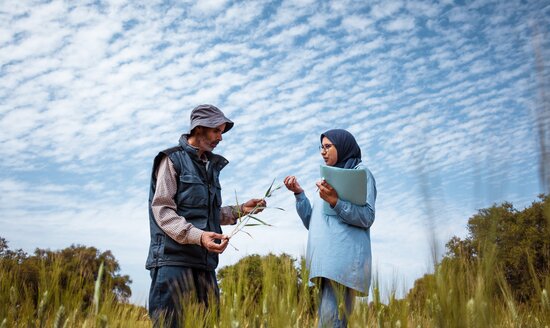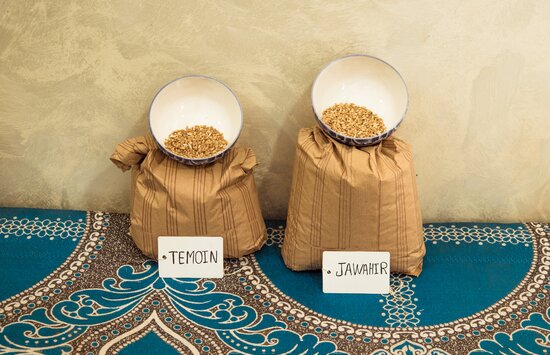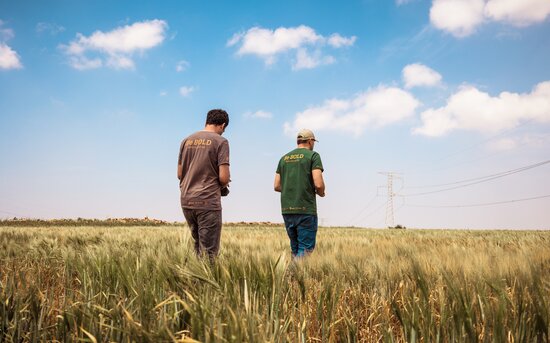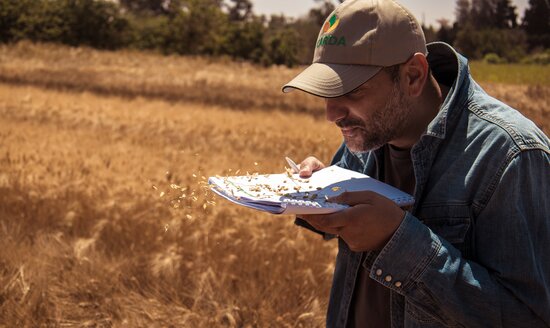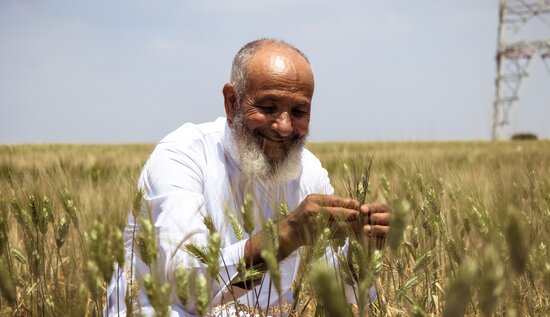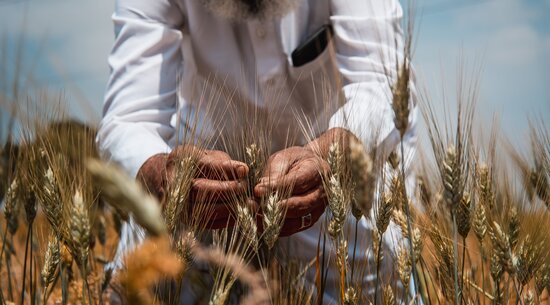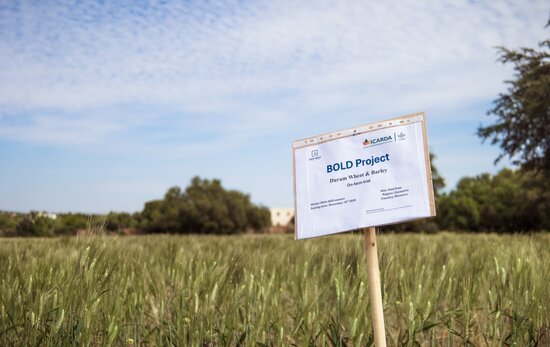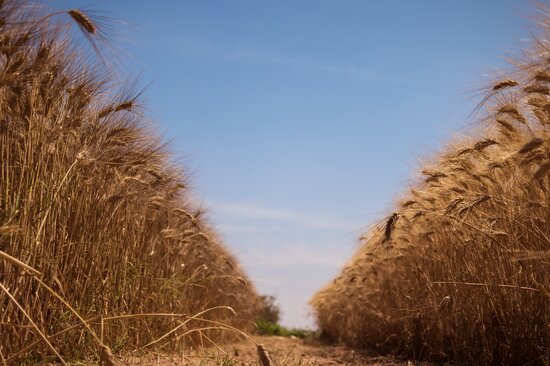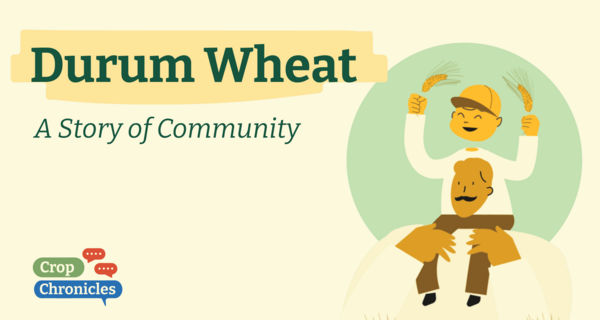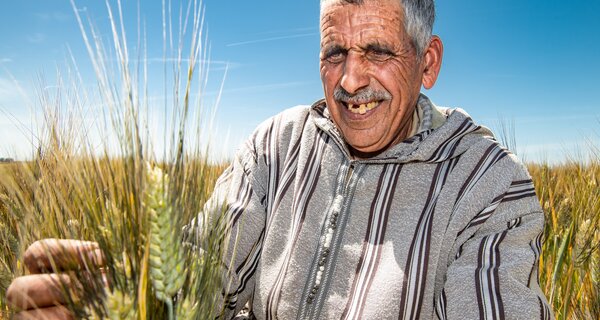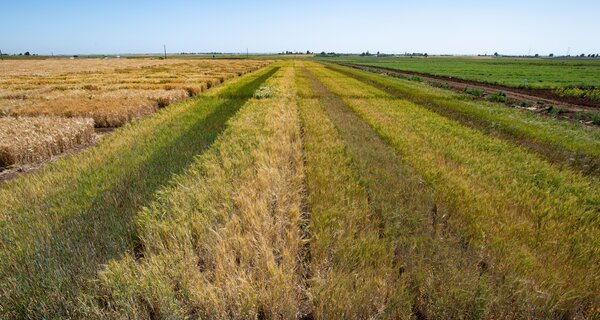New Drought-tolerant Durum Wheat Variety Proves Its Worth in Morocco
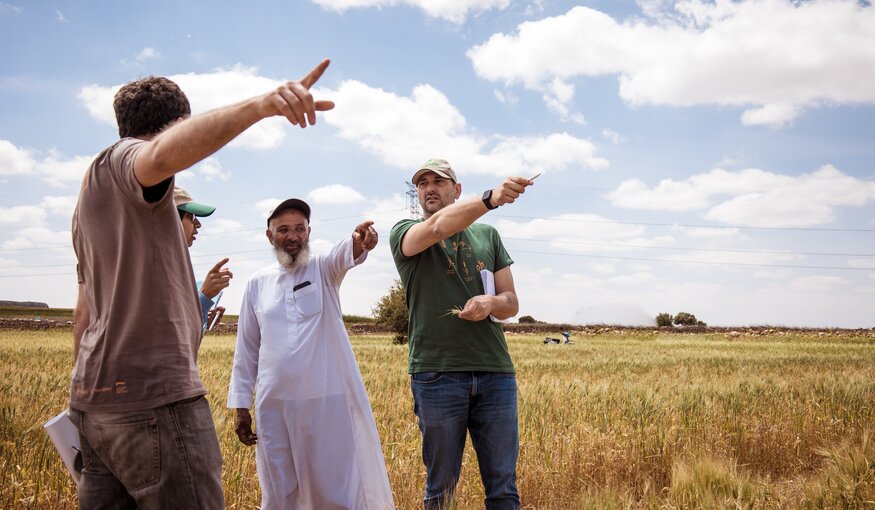
Scientists of the BOLD Project talking with a farmer who evaluated the Jawahir durum wheat variety on his farm located in the dry region of Safi. Photo: Ahmed Ismaili / Crop Trust
17 June 2025
As seed multiplication efforts for the durum wheat variety Jawahir continue, farmers in drought-stricken regions of Morocco get a first taste of its potential.
BONN, GERMANY, 17 June 2025 – “We prefer not to plant. It’s too dry,” says a farmer in Sidi Abdellah El Bouchouari, Tiznit, in the south of Morocco.
With most areas receiving the first rains more than two months after the usual start of winter, the 2024-2025 farming season in the south of Morocco is proving very dry again. This threatens Morocco's cereal production, including durum wheat, a crop vital to the country’s food security. Used to make couscous, bread and pasta, durum wheat is enormously important in Morocco and across the globe. In Northern Africa, people consume it daily, providing crucial calories and protein.
The dry climate is nothing new to those living off the soil. In Morocco, farmers have managed to survive and produce this cereal with little water for centuries. However, with record-breaking droughts in the past decade, farmers are struggling to make a living. Where once golden crops dominated the landscape, brown, drought-stricken fields now prevail.
A New Hope
On this date that marks the United Nations annual “World Day to Combat Desertification and Drought” a new durum wheat variety is doing just that, fighting off drought in farmers’ fields: Jawahir – which means “jewel” in Arabic – was developed using genes from Iraqi Triticum araraticum, a wild ancestor of durum wheat which had been safeguarded in the genebank of the International Center for Agricultural Research in the Dry Areas (ICARDA). Released in Morocco in 2023 by the National Institute for Agricultural Research in Morocco (INRA), Jawahir is the result of over ten years of research and testing. That process was supported by the Crop Trust’s Biodiversity for Opportunities, Livelihoods and Development (BOLD) Project. Funded by the Government of Norway, BOLD strengthens food and nutrition security worldwide by supporting the conservation and use of crop diversity.
“Wild plants, which have survived millennia of extreme climatic conditions without the help of farmers, contain traits that can help us build resilient crops capable of withstanding the pressures of today’s climate crisis,” says Dr. Benjamin Kilian, the BOLD Project Coordinator at the Crop Trust, an international organization dedicated to conserving crop diversity and making it available for everybody, forever.
Farmers Taste the Value of Jawahir
Developing a new crop variety takes a lot of time and effort. As part of the BOLD Project, ICARDA and INRA have tested hundreds of durum wheat varieties infused with genes from its wild relatives across Moroccan research farms. Since 2020, the most promising ones, including Jawahir, have been given to farmers to test. Planted by farmers during the severe drought affecting different regions of Morocco, Jawahir once again confirmed its drought tolerance. Farmers in Essaouira, Tiznit, and Safi provinces saw it standing strong in their fields, often yielding more than 1.5 tons per hectare, while the surrounding fields with older varieties struggled to reach 1 ton.
“We have successfully developed a variety suitable for very dry conditions. It truly is a jewel. The challenge now is to get it into farmers’ hands on a large scale. This is how we will make a difference in their lives” said Dr. Filippo Bassi, Principal Scientist at ICARDA and BOLD’s lead partner for durum wheat and barley.
Ramping up seed production
Farmers who tested Jawahir are confident of its benefits. Drought resistance translates directly into better and more stable harvests, but to sow it on their farms, and their neighbors’ farms, they will need large quantities of seed. Normally, a newly released variety in Morocco needs six years of seed multiplication to reach commercial scale. But at the time of release, the Ministry of Agriculture expedited the process for Jawahir due to its “national importance in the face of drought”. Despite the challenges of this season, INRA and its private and public partners – La Société Nationale de Commercialisation des Semences (SONACOS), the Association Marocain de Multiplicateurs de Semences (AMMS), and the Fédération Nationale Interprofessionnelle des Semences (FNIS) – are working against the clock. They want to achieve commercial seed production two years ahead of schedule, by 2027.
The Green Generation 2020-2030 strategic plan of the Moroccan Ministry of Agriculture recognizes the importance of such an ambitious program for the multiplication and dissemination of certified seeds.
“Achieving commercial scale four years after official release will set a new record for us, but thanks to the support of our government and all our seed partners, I feel it can be done,” said Moha Ferrahi, INRA’s director of breeding and genetic resources.
Next Steps
The BOLD Project shows that concrete solutions exist to respond to climate change. We must invest in genebanks that safeguard crop diversity, advance breeding efforts that explore and use untapped crop diversity, and involve farmers in evaluating promising new varieties. But to make all that count, government backing is essential. Jawahir is a powerful insight for governments around the world. By working together, we can secure the future of food.
# # #
About the Crop Trust
The Crop Trust is an international organization working to conserve crop diversity and thus protect global food and nutrition security. At the core of Crop Trust is an endowment fund dedicated to providing guaranteed long-term financial support to key genebanks worldwide. The Crop Trust supports the Svalbard Global Seed Vault and coordinates large-scale projects worldwide to secure crop diversity and make it available for use. The Crop Trust is recognized as an essential element of the funding strategy of the International Treaty on Plant Genetic Resources for Food and Agriculture. Learn more at www.croptrust.org.
About the BOLD Project
BOLD (Biodiversity for Opportunities, Livelihoods, and Development) is a major 10-year project to strengthen food and nutrition security worldwide by supporting the conservation and use of crop diversity. The project works with national genebanks, pre-breeding and seed system partners globally. Funded by the government of Norway, BOLD is led by the Crop Trust in partnership with the Norwegian University of Life Sciences and the International Plant Treaty.
About ICARDA
ICARDA, the International Center for Agricultural Research in the Dry Areas, is an international organization undertaking research for development. We provide innovative, science-based solutions for countries across the non-tropical dry areas. Our research aims to reduce poverty and enhance food, water, and nutritional security and environmental health, in the face of global challenges, including climate change. Learn more at www.icarda.org.
About INRA
The National Institute for Agricultural Research "INRA" has the mission to undertake research for agricultural development. It is a public institution whose origins go back to 1914 with the creation of the first official agricultural research services. He has recently undergone a structural reorganization aimed at modernizing his management process. Learn more at www.inra.org.ma.
For more information, please contact:
Luis Salazar (luis.salazar@croptrust.org) – English, Spanish
Zineb Belhadfa (zineb.belhadfa@gmail.com) – Arabic, French (cc: media@croptrust.org)
Images
Categories: For The Press, Press Releases, Food Security, Nutritional Security

